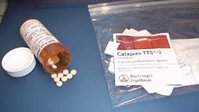Dry mouth is more than an uncomfortable condition; lack of saliva contributes to tooth decay. In a news release from the University of Rochester Medical Center, Gene Watson, DDS, PhD, director of the Salivary Dysfunction Center, says: "Our saliva washes away sugars and other substances that help promote cavities. It neutralizes the acids in our mouths.... And it's concentrated with minerals like calcium and phosphate. When you eat sugar, bacteria on your teeth produce acid that demineralizes the teeth a little bit, but then the saliva flows in and replaces the layer that has been removed."
Over 600 medications lessen saliva flow, affecting millions of people--particularly the elderly who frequently take multiple saliva-inhibiting drugs. Dr. Watson and colleagues are using rats to study the relationship between cavity incidence, saliva flow, and specific drugs. Rats are known to respond to the same cavity-promoting and cavity-inhibiting factors as humans. Studies have shown that rats that receive atropine or propranolol develop more cavities than those that do not. Drugs that are similar to atropine, including antihistamines (eg, Benedryl) and some anti-depressants (eg, Elavil, Aventyl), also inhibit secretions, including saliva. Propranolol, which is usually prescribed for hypertension and heart problems, contributes to tooth decay by altering saliva's composition.
A third drug investigated by Watson's team, clonidine, increased decay on the smooth areas of rats' teeth by 84%. Clonidine was designed to manage hypertension, but it is also being used off-label to treat children with attention deficit hyperactivity disorder. This drug reduces acetylcholine and norepinephrine, neurotransmitters that, among other effects, stimulate the salivary glands to produce saliva. In addition to drugs that inhibit saliva or change its composition, two physical conditions can inhibit saliva production: Sjogren's syndrome, an autoimmune illness, and damaged salivary glands caused by radiation therapy to the head or neck.
Watson urges doctors to recognize the dental consequences of dry mouth. When patients experience dry mouth, he suggests that doctors switch to another medicine, reduce the dose, or change the time that the medication is given. Watson also recommends that patients who have problems with dry mouth brush their teeth more often, snack on food less frequently, use a mouthwash with fluoride, and make diet changes to help protect teeth from decay.
Many Common Drugs Promote Tooth Decay (from a University of Rochester News release) 29 May 2000 www.sciencedaily.com
briefed by Jule Klotter
COPYRIGHT 2005 The Townsend Letter Group
COPYRIGHT 2005 Gale Group



